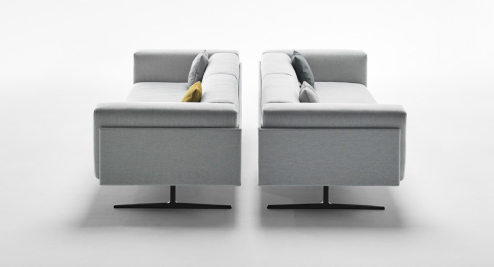

Office Culture



Creating the right corporate culture is critical to any company’s success. It aligns workers to a common goal and creates camaraderie. It also sends a message of professionalism to a company’s customers and helps attract top talent.
Yet it can be difficult for companies to design and create. The corporate culture at a traditional law firm or accounting office is going to be far different than that of an advertising agency or tech company. Companies must work to define their culture and create the right feeling for their employees and customers.
The right office furniture and design can help. For example, a ping pong table might be entirely appropriate for the fun and fast-moving culture found at an advertising agency, but it would not work for the culture of a law firm. And while traditional private offices with wood desks might be perfect for the accounting office, they would be out of place for a tech firm.
The right corporate culture is critical, especially to a company’s profitability. According to a Gallup poll, employers could expect 33 percent higher revenue by “creating a culture that attracts star talent.”
Creating Culture
That’s why the first step in aligning office space with culture is figuring out what your company’s culture should feel like. This first step should start at the top with the company’s chief executive or managing director. The idea behind a company’s culture should come from the top, but executives should include the entire company to work on the details.
Every company’s culture will be different depending on the segment in which it operates and the personality of its leadership. That means even though law firms traditionally have more conservative offices, not all of them do. And even though tech companies tend to have more casual environments, that’s not true for all of them.
Creating culture takes time. When executives begin thinking about culture and come up with their vision for the company’s culture, it may take a while for the culture to become established. Think about it like planting a seed: While it might take time for the plant to grow and flourish, it will soon flower and produce fruit.
Some studies estimate that a company culture that inspires high employee engagement can expect 18% higher revenue per employee. Company culture is a worthwhile investment with real, significant returns.

Encourage Individuality When Possible
After envisioning the cultural goals, executives should begin to include workers in the conversation. Leadership should ask workers to get involved. That could happen in the form of a survey if it is a large company, or a simple meeting if it is smaller.
Encouraging participation can help workers feel more comfortable and engaged in their own space. That makes for a more productive office and builds loyalty as well. Team building events should be planned with idea boards where workers can share their thoughts on how the office should look and be designed.
Allowing workers, a chance to add things such as photos, plants, or personal items can create a feeling of inclusion and help build a sense of teamwork and a personal “buy-in” from employees.
Job seekers often look for companies that align with their career goals as well as their personal beliefs. A recent study from Glassdoor shows that 77% of workers would consider a company’s culture before applying for a job there. The same study adds that 56% of workers value a company’s culture over a competitive salary. It is that important.

Design Inspiration
Your corporate culture might already be flourishing, yet your physical office space might not be properly aligned. Office space can lag the progression of the corporate culture. If that’s the case for your office, do not be concerned. It happens often, so it is important to occasionally check the status of how your corporate culture is progressing.
A small startup that is growing quickly might outgrow its casual small business feel. As it gets larger, it might need a more professional workspace with quality desks, chairs, and furnishings. It is important that as your company’s corporate culture evolves, it is reflected in the workplace.
Consider some office staples, and how they could potentially impact team interactions. Cubicles, for example, tend to offer privacy and encourage quiet work. Whereas an open, community table stimulates more informal chatter, collaboration, and conversation. Both work formats have their merits, so choosing the ideal office furniture and floor plan hinges on the exact culture team leaders wish to develop.
Use furniture that’s not just functional but creative, as well. If you’d like to draw on the creativity of your corporate culture, add custom art pieces and designs. Use innovative names for conference rooms and fill the space with color. By making a statement with your space, you’re inspiring your employees to create more meaningful work.

Brand your space
Making a statement about your space should not be thought of as frivolous. It is important to align the look and feel of your office with your company’s culture, which should match the company’s brand as well.
If your company is involved in sports medicine, for example, you might add photos of world-famous athletes to your walls. Or create conference rooms that celebrate different sports or sporting events.
Branding your space will help as your company grows. As you add locations, you can simply copy what you have already established — it fits your company culture. Or your culture is such that you want each location to be completely different. Just make sure you are consistent as you brand your space so as not to confuse the market or your employees.

Creating the right corporate culture is critical to any company’s success. It aligns workers to a common goal and creates camaraderie. It also sends a message of professionalism to a company’s customers and helps attract top talent.
Yet it can be difficult for companies to design and create. The corporate culture at a traditional law firm or accounting office is going to be far different than that of an advertising agency or tech company. Companies must work to define their culture and create the right feeling for their employees and customers.
The right office furniture and design can help. For example, a ping pong table might be entirely appropriate for the fun and fast-moving culture found at an advertising agency, but it would not work for the culture of a law firm. And while traditional private offices with wood desks might be perfect for the accounting office, they would be out of place for a tech firm.
The right corporate culture is critical, especially to a company’s profitability. According to a Gallup poll, employers could expect 33 percent higher revenue by “creating a culture that attracts star talent.”
Creating Culture
That’s why the first step in aligning office space with culture is figuring out what your company’s culture should feel like. This first step should start at the top with the company’s chief executive or managing director. The idea behind a company’s culture should come from the top, but executives should include the entire company to work on the details.
Every company’s culture will be different depending on the segment in which it operates and the personality of its leadership. That means even though law firms traditionally have more conservative offices, not all of them do. And even though tech companies tend to have more casual environments, that’s not true for all of them.
Creating culture takes time. When executives begin thinking about culture and come up with their vision for the company’s culture, it may take a while for the culture to become established. Think about it like planting a seed: While it might take time for the plant to grow and flourish, it will soon flower and produce fruit.
Some studies estimate that a company culture that inspires high employee engagement can expect 18% higher revenue per employee. Company culture is a worthwhile investment with real, significant returns.
Encourage Individuality When Possible
After envisioning the cultural goals, executives should begin to include workers in the conversation. Leadership should ask workers to get involved. That could happen in the form of a survey if it is a large company, or a simple meeting if it is smaller.
Encouraging participation can help workers feel more comfortable and engaged in their own space. That makes for a more productive office and builds loyalty as well. Team building events should be planned with idea boards where workers can share their thoughts on how the office should look and be designed.
Allowing workers, a chance to add things such as photos, plants, or personal items can create a feeling of inclusion and help build a sense of teamwork and a personal “buy-in” from employees.
Job seekers often look for companies that align with their career goals as well as their personal beliefs. A recent study from Glassdoor shows that 77% of workers would consider a company’s culture before applying for a job there. The same study adds that 56% of workers value a company’s culture over a competitive salary. It is that important.
Design Inspiration
Your corporate culture might already be flourishing, yet your physical office space might not be properly aligned. Office space can lag the progression of the corporate culture. If that’s the case for your office, do not be concerned. It happens often, so it is important to occasionally check the status of how your corporate culture is progressing.
A small startup that is growing quickly might outgrow its casual small business feel. As it gets larger, it might need a more professional workspace with quality desks, chairs, and furnishings. It is important that as your company’s corporate culture evolves, it is reflected in the workplace.
Consider some office staples, and how they could potentially impact team interactions. Cubicles, for example, tend to offer privacy and encourage quiet work. Whereas an open, community table stimulates more informal chatter, collaboration, and conversation. Both work formats have their merits, so choosing the ideal office furniture and floor plan hinges on the exact culture team leaders wish to develop.
Use furniture that’s not just functional but creative, as well. If you’d like to draw on the creativity of your corporate culture, add custom art pieces and designs. Use innovative names for conference rooms and fill the space with color. By making a statement with your space, you’re inspiring your employees to create more meaningful work.
Brand your space
Making a statement about your space should not be thought of as frivolous. It is important to align the look and feel of your office with your company’s culture, which should match the company’s brand as well.
If your company is involved in sports medicine, for example, you might add photos of world-famous athletes to your walls. Or create conference rooms that celebrate different sports or sporting events.
Branding your space will help as your company grows. As you add locations, you can simply copy what you have already established — it fits your company culture. Or your culture is such that you want each location to be completely different. Just make sure you are consistent as you brand your space so as not to confuse the market or your employees.
